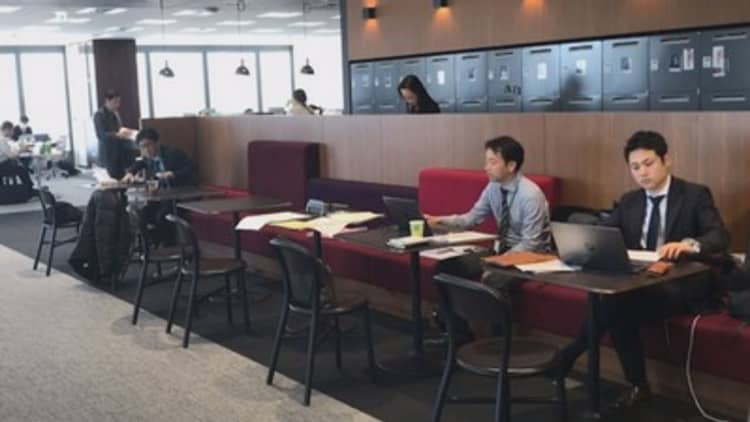
In a nation known for long working hours and a firm top-down corporate culture, one company is rethinking how it does business.
CBRE, one of the world's largest real estate firms, has redesigned its offices in Japan, doing away with permanent desks and instead adopting an activity-based workplace. Every employee — including its CEO — now gets a locker for their belongings instead of desk drawers.
CNBC visited the company's new space in Tokyo, which boasts a large cafe for both working and meetings, and it trades in the traditional corner office for open collaboration areas.
"In the old office you went to your desk and did your work, that's it. You couldn't accidentally meet someone from another department or chat about a new opportunity," Chinatsu Kaneko, CBRE's workplace strategy director said.
"Benefits like having a private office are just entitlement," she added. "How is that an actual reflection on your power or position?"
The transition, which is similar to office styles made popular by Silicon Valley tech firms, is designed to increase both collaboration between teams and employee satisfaction.
According to its research across multiple industries, 87 percent of organizations said culture and engagement are one of their top challenges. But in Japan, only 7 percent of company employees said they feel engaged in their work.
But the change wasn't met with open arms by all the employees.
"Some people said, 'my career is 20 years old and I have my way of doing things and I don't want to change,' " Kaneko said. "You have to help them see the benefits step by step."
CBRE's transition is part of a global initiative, called Workplace 360, which transforms all of its offices to free collaborative environments. Its Tokyo office is being described as a lab which allows its clients to see the space firsthand and plan their own office transition. The Tokyo space is now adding sensors to track and record data on employees' movement throughout the day.
Kaneko said if new government reforms gain traction in Japan, CBRE's office style and services could gain in popularity as firms scramble to adapt.
Japanese Prime Minister Shinzo Abe began efforts this year to regulate overtime work in a culture where "death by overwork" is considered a problem.
But while the transition may be a welcome change to quality of life, Japan's economic strength might be another story.
In a note, Deutsche Bank recently said Japan's efforts to cut back on excessive working hours could weigh heavily on economic growth. The firm cut Japan's economic growth forecast to 1.0 percent in 2017 and 1.1 percent in 20018, from 1.1 percent and 1.4 percent, respectively.


